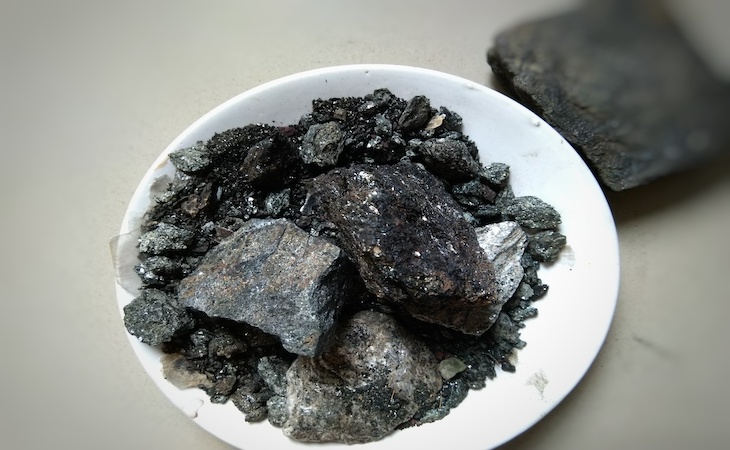
September 4, 2025
The Sleep Benefits of Shilajit, an Ancient Herbal Medicine
Written by Shelby Deering

Shilajit, a tar-like substance from the Himalayas, is rich in antioxidants and minerals that support energy, brain function, and sleep. Used in Ayurvedic medicine for centuries, it may enhance circadian rhythms, reduce cortisol, and boost melatonin. Not recommended for children, pregnant individuals, or those with certain blood or hormone conditions.
Ayurveda is a wellness practice that originated in India centuries ago. It’s known for its holistic approach to treating the body, mind, and spirit through natural remedies.
These methods continue to be popular today—and there are many Ayruvedic practices and herbal medicines that can potentially benefit sleep.
One that’s on-trend right now is shilajit, a sticky black substance found in Himalayan rocks. But what does shilajit do? What are the benefits of shilajit? Ahead, we’ll explore the sleep benefits of shilajit and how to add it to your routine for the best results.
What is shilajit?
Calling shilajit a “unique substance,” Maz Roginski, doctor of Chinese medicine, says it’s a combination of plant, animal, and mineral materials that seeps from rocks in the high mountains of central Asia during the warmer months. It has a tar-like appearance and deep, earthy scent.
It’s been used for thousands of years in Ayurvedic medicine, also appears in Tibetan, Chinese, and Russian medicine, and has been considered a tonic for the whole body.
Shilajit is rich in antioxidants—especially fulvic acid—and a host of trace minerals (like iron, magnesium, selenium, copper, and zinc) which support the functions of several body systems, explains Roginski.
Health and sleep benefits of shilajit
Boosts energy
So, what is shilajit good for? When it comes to shilajit benefits, research indicates this substance supports mitochondrial function and energy production, “so it can boost energy and ease chronic fatigue,” says Roginski.
Provides antioxidants
Since shilajit is such a powerhouse of antioxidants, Roginski says it can ease inflammation and support the repair of cells and tissues.
Antioxidants protect against free radicals (which can cause cellular damage), and as Roginski notes, mitigating cellular damage is a key component in slowing the aging process.
“The antioxidant capacity of shilajit can also support heart health, regulate cholesterol, and boost circulation,” she says.
Betters brain health
“Fulvic acid has also been shown to protect the brain from both damaging protein buildup and inflammation,” says Roginski. “This is why it’s used to enhance concentration, focus, and memory and as protection against Alzheimer’s disease.”
Improves sleep
Shilajit aids all of the above processes and supports health across many body systems, which can allow us to rest more deeply, says Roginski.
“Additionally, natural medicines encourage us to align more closely with nature’s cycles and healing wisdom,” she says. “Shilajit can support our natural circadian rhythms (and our sleep-wake cycle) as it contains magnesium—this, in turn, can decrease cortisol (stress hormone) and support melatonin.”
How to use shilajit
It’s important to follow guidance on using shilajit. Always use caution when adding new supplements to your routine and chat with your healthcare provider first.
That said, Roginski recommends going slowly and tuning into your body when you start shilajit (and with any new supplement, for that matter).
To find out how to take it specifically for your body, Roginski encourages you to check in with a natural health practitioner and find out if it’s appropriate for you. But she does note that it’s regarded as a safe supplement for many.
In general, shilajit can be consumed through capsules or tablets or dissolved in liquid. Roginski says a dosage can run from 200 to 2,000 milligrams daily, and splitting 500 milligrams across two doses is common.
“Traditional dosage is a rice to pea-sized amount, under the tongue or dissolved in warm water or milk,” she says.
Just keep in mind this isn’t for everyone. Per Roginski, research points to several groups who should avoid shilajit: those with sickle cell anemia, hemochromatosis (as it can increase already elevated iron levels), or thalassemia (a blood disorder), and those who are pregnant or breastfeeding.
Also, since it can lower blood sugar, it can interact with diabetic medications. It’s not recommended for those with concerns about elevating testosterone, either. And it’s typically not recommended for children.
Since shilajit may be stimulating for some individuals, a morning dosage is usually best, says Roginski.
FAQs
What are the benefits of taking shilajit?
What is shilajit used for? Roginski lists the potential benefits of taking shilajit, which include boosted energy, high levels of antioxidants, improved brain health, and better sleep.
What happens if I take shilajit daily?
While you may experience some of the health benefits if you take shilajit daily, but Roginski notes efficacy will depend on each individual.
Who can’t take shilajit?
“Due to its ability to lower blood sugar and raise iron and testosterone, those with concerns in these areas should consider if it is appropriate for them,” says Roginski. Additionally, those with sickle cell anemia, hemochromatosis, and thalassemia should avoid it, along with those who are pregnant or breastfeeding. It’s also not recommended for children.
Interested in exploring other sleep supplements? Next, learn about GABA and how it can improve your sleep.
Shelby Deering
Shelby Deering is a Madison, Wisconsin-based freelance lifestyle writer contributing home design and health articles to national publications. When she’s not writing, you’ll find her hiking, running, or walking with her husband and corgi, Dolly.


